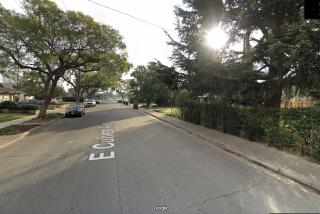Army Will Review Soldier’s WWII Execution
- Share via
On May 30, 1944--in the midst of World War II--U.S. Army Pvt. Alex F. Miranda stood before an American firing squad in England and spoke his last words.
“Pray for me,” the 20-year-old soldier from Santa Ana beseeched a chaplain. “And may God have a place for you in heaven.”
Then Pvt. Miranda, who had fatally shot his sleeping sergeant almost three months earlier, was felled by a volley from 10 rifle-bearing soldiers.
Nearly half a century later, Miranda’s family remains disturbed by the events leading to his execution. Louis Martinez Jr., 47, a cement worker from Santa Ana, said he “was always bothered” by his family’s story of how his uncle had died.
On behalf of other family members, Martinez set out last year to, as he put it, “find out what really happened.” He sent for the 50-page court-martial transcript from a military archives vault in St. Louis.
Reading the transcript last August, Martinez said, he became convinced that his uncle had been too intoxicated at the time of the shooting to realize the consequences of his action and thus should not have been executed.
In November, Martinez filed a formal request that the Army reverse his uncle’s murder conviction and instead find him guilty of the lesser charge of manslaughter. Martinez also asked that his uncle’s remains be exhumed from a military cemetery in France and returned to his family.
Agrees to Review
A few weeks ago, the Army notified Martinez that it has agreed to review the case. Military spokeswoman Joyce Wiesner said the review could take place in the next six months to a year.
The Army routinely reviews requests for changes in military records. But officials at the Army’s Board for Correction of Military Records in Washington said the Miranda case is the first they had ever heard involving a request to downgrade a criminal charge after a soldier had already been executed.
David Kinneer, executive secretary of the board, said he has reviewed thousands of cases in his four years with the agency and has never come across a request like this.
Typically, Kinneer said, the board hears requests to upgrade a discharge from dishonorable to honorable. It fields about 20,000 requests for records changes each year, about a fourth of them involving World War II soldiers, Kinneer said.
Kinneer could not predict what would happen with the Miranda case. He said it might have to be referred to the Army’s military justice system, which has jurisdiction in criminal cases.
Just a Footnote
At the time of Pvt. Miranda’s death, his case was little more than a footnote to the story of the European Theater of World War II. His execution took place exactly a week before a much more momentous event--the invasion of Normandy by Allied troops.
The execution drew little public attention. The Los Angeles Times recorded the incident with a one-paragraph story, under the headline “Soldier Slayer Pays With Life.”
During World War II, military records show, at least 142 U.S. soldiers were executed by the military for such crimes as rape, murder and desertion.
Had the killing involved soldiers of equal rank, military officials who reviewed the case in 1944 said, Miranda probably would have been sentenced to prison. However, in affirming the decision to execute Miranda, Maj. Gen. R. O. Barton said that an example needed to be set in this case for other soldiers.
“In the interests of military discipline, it is considered necessary to give warning to all ranks that no one who kills a superior officer or noncommissioned officer, either in the heat of battle or in the calm of barracks, drunk or sober, will be permitted to escape the severest of penalties,” Barton wrote in 1944.
It was a series of seemingly trivial incidents that led to Miranda’s shooting of 1st Sgt. Thomas Evison, 40, of Port Norris, N.J., in the predawn hours of March 5, 1944, according to a copy of the court-martial transcript. The two were stationed together in the 42nd Field Artillery Battalion outside the village of Honiton, England.
Miranda, a high school dropout who worked odd jobs before entering the Army in 1943, had been arrested by civilian constables earlier that night for urinating in public in Honiton. The constables testified that Miranda had been drinking, although they did not believe he was too intoxicated to not know what he was doing.
After making threats against the constables and calling one a “fine fat sergeant,” he was released the same night to his barracks hut, which he entered in a “noisy, boisterous manner,” according to the military records.
Inside the hut, he told one sergeant that he was worried that Evison, a respected soldier with a reputation for strict discipline, would “ride” him for the urinating offense, which he denied. Evison, oblivious to Miranda’s arrest, was snoring loudly nearby.
In the yellowish glow of a heating stove, other soldiers could see Miranda undressing to his underwear and then walking over to Evison’s bunk, where he awakened the sergeant and angrily told him to stop snoring, the court-martial transcript shows. Evison groggily ordered Miranda to go back to bed “and do your own snoring.”
Evison turned over and fell back to snoring, while Miranda returned to his bunk and stood smoking a cigarette, glowering at Evison. When another soldier asked him what was wrong, Miranda replied that “he was worrying about the first sergeant” punishing him for urinating in public.
Miranda extinguished his cigarette and went outside. He returned with a .30-caliber carbine, stood over Evison’s bunk and aimed it at Evison’s forehead. He fired a single shot, witnesses testified.
Then Miranda began laughing hysterically, telling the other soldiers, “Your worries are over now, boys. I have shot the first sergeant.” As guards led him away a short time later, Miranda could be heard giggling the whole way, the military records said.
Later questioning of the other soldiers revealed that Miranda had harbored an intense dislike for Evison, although there had been no overt friction between the two. Miranda’s family said he felt “picked on” because of his ethnic origin.
As evidence of such prejudice, Martinez cited a March 25, 1944, passage written by Lt. Col. White E. Gibson, recommending the death penalty for Miranda. Noting that Miranda was a Latino, Gibson wrote: “Those (Latinos) are undemonstrative and uncommunicative, as well as being inclined to violence when drinking.”
As a result of such prejudice, family and fellow soldiers said, Miranda felt that the first sergeant made him perform more than his share of duties. Sgt. Solomon R. Richardson testified that Miranda “hated and cursed” Evison, but that he behaved normally until he had had too much to drink.
“He had a peculiar laugh which he used on all occasions when drinking, and it was the same laugh he used after the shooting,” Richardson testified.
Charged With Murder
After the shooting, Miranda was charged with murder and a court-martial was hastily convened. During the proceeding, Miranda pleaded not guilty but declined to make any statements on his own behalf. His lawyer relied upon intoxication as a defense, but the military tribunal concluded that Miranda--under the influence or not--was well aware of what he was doing, as evidenced by the fact that he paused to smoke a cigarette before the shooting.
The tribunal’s recommendation of execution was upheld through the entire military chain of command, up to and including Gen. Dwight D. Eisenhower, supreme commander of Allied Forces in Europe, the records show.
The military tribunal decreed that the execution was to be carried out by firing squad rather than hanging. Military officers noted at the time that this was the first execution by shooting during the war and that it represented a less shameful way to die. The tribunal offered no explanation, however.
Martinez contends that the court offered Miranda a less shameful way to die because it knew it was “railroading” him.
In his petition for redress, Martinez argues that his uncle could not have been found guilty of murder because murder implies premeditation.
“The accused was drunk and not in his right mind,” Martinez wrote in his petition. “The act of premeditation would assume the accused was in control of his faculties, and he obviously was not.”
He also maintained that the Army did not really care whether Miranda was drunk.
“I contend the accused was going to be found guilty no matter what the truth was, and the only leniency granted by the court was that he was shot rather than hanged,” Martinez said in the petition.
Martinez enlisted the Veterans Service Office, which has representatives throughout the state and assists families of veterans in disputes with the U.S. government, to provide him with legal assistance in the case.
Bill Peeler, an officer with the Veterans Service in Merced County--where Martinez lived when he first began looking into his uncle’s case--said he believes that Miranda was unjustly executed because he was too intoxicated to know what he was doing. Nevertheless, he holds out little hope that the government will overturn the original ruling.
“The chances are slim to none,” said Peeler, who is not a lawyer. “I think I’m right, and I think he (Martinez) is right, and I think they railroaded him. Unfortunately, Miranda was in the wrong time and the wrong place.”
More to Read
Sign up for Essential California
The most important California stories and recommendations in your inbox every morning.
You may occasionally receive promotional content from the Los Angeles Times.













